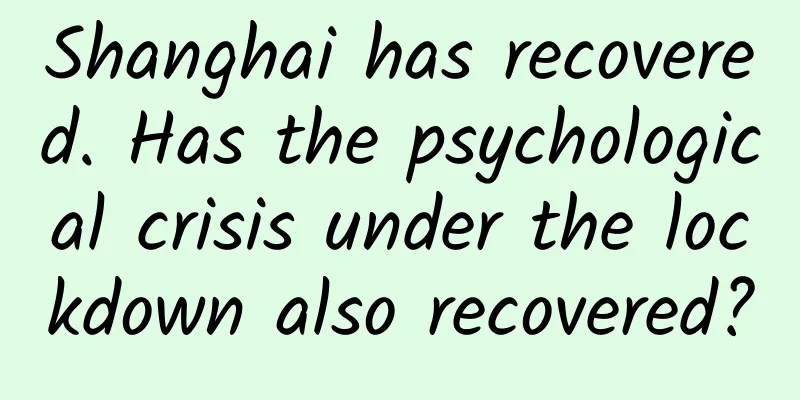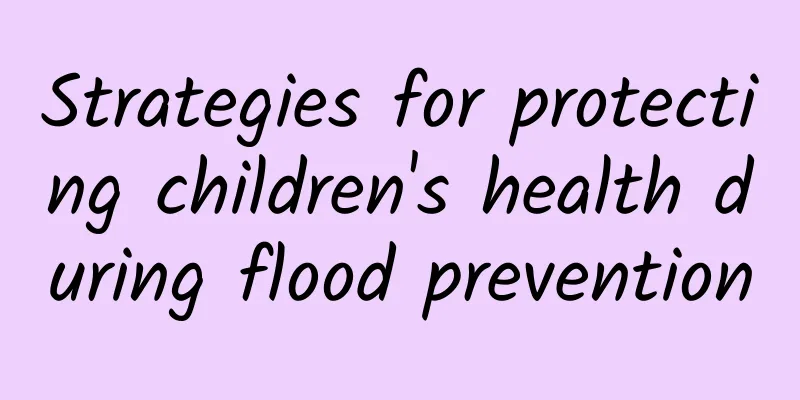Shanghai has recovered. Has the psychological crisis under the lockdown also recovered?

|
From 00:00 on June 1, 2022, Shanghai fully restored the normal life order in 283 prevention areas, which means that most citizens who were sealed in the community and could not leave their homes for two months or even three or four months can finally go out on the streets freely. At the same time, residents in 19 blockade areas and 64 control areas still need to "control the soul's desire for freedom." Under the situation that the epidemic prevention situation is still severe, many places across the country have implemented the practice of "blockade, control, and prevention" three-zone division. On the one hand, this helps to ensure the goal of dynamic zeroing, and on the other hand, it also brings unusual challenges to people's lives. And the psychological pressure and possible psychological crisis that each individual under blockade and control has to bear requires us to sort out, analyze, alleviate, and heal, and at the same time provide some experience and help methods for people who may face such psychological distress in the future. Written by: Zhuang Shujie (Master of Applied Clinical Psychology and Counseling, Peking University, Registered Psychologist in the Chinese Psychological Society Clinical Psychology Registration System), Wang Jiachun (Master of Applied Clinical Psychology and Counseling, Peking University) Although science is objective and rational, I still feel sad and heavy when writing this. At a time when we are looking forward to the "unblocking", there are still communities in Shanghai that have to continue to maintain 14 days of closed management due to the detection of positive cases again. At this moment, there are still many people who are still worried that they will be suddenly locked down again because of "positive cases" around them. Lockdowns and controls are not terrible in themselves, and some people even like to stay at home. What has a greater impact on people is the psychological distress caused by "not being allowed to go out" and the resulting series of challenges and difficulties in diet, medical treatment, work, interpersonal relationships, and finances. For many people, the epidemic, lockdown, and control are sudden negative events that they have almost never experienced before, which can be psychologically called "stressful life events." Accordingly, people will also experience the four stages of psychological stress response, and many negative emotions are normal reactions caused by adapting to stressful events. Isolation (whether it is home isolation or community isolation) will have many psychological effects on people, some of which are negative, but just as there are both dangers and opportunities in a crisis, during the isolation period, we may also experience some positive and positive feelings and experience our ability to adapt. The following will show the general psychological impact of the lockdown policy on people according to the time clues of isolation. one Before quarantine: difficult to accept, fearful In most cases, quarantine does not happen without warning. Some people are quarantined because they suddenly test positive, but more people see an increase in cases in nearby areas (such as communities) before they begin to sense that they may be sealed off or controlled. This uncertainty of "maybe it's sealed off, or it may not be sealed off" can cause panic and anxiety. When a bad thing is likely to happen, the anxiety it causes is often stronger than if it has already happened. Fear is unpredictable - once quarantine and lockdown fall on you, do you have the ability to bear and cope with it? At the same time, anxiety also contains hope - "Maybe I still have a chance to do something to reduce possible pain in the future." Therefore, during this period, people's desire to stock up is the strongest, even stronger than those who have been locked up, because stocking up can calm fear. Some people are more optimistic and stock up less; some people are more pessimistic and stock up more. Different coping styles are related to past experiences, family influences, and expectations of the external environment. It cannot be simply said that "stocking up more" or "stocking up less" is better. It mainly depends on which coping style is more in line with the actual living situation of the quarantine and lockdown. In retrospect, this coping style will appear to be more socially adaptable. For example, when Shanghai people heard that "it will be closed for 4 days", everyone rushed to buy, but in fact it was closed for far more than 4 days. As a result, some people did not stock up enough and even fell into a situation of running out of food; some people were glad that they were well prepared. Influenced by Shanghai, Beijing also saw a stockpiling craze earlier, but later it was found that many places had sufficient supplies, and stockpiling vegetables might waste food. These situations are difficult to accurately predict in advance, but they will affect people's psychological state afterwards. two Early days of quarantine: changes and challenges in all aspects of life Even if you have been prepared mentally and in terms of materials, the lockdown may still come quite suddenly. For many people, this is an unprecedented life experience and a stressful event. After the building and community were sealed off, life changed drastically. People had to accept the challenge of adapting, change their previous habits, and learn to do things they used to do in new ways, such as shopping, cooking, and interacting with family members frequently. Some people's lives have indeed encountered difficulties at the practical level due to the lockdown. Therefore, effective help at the practical level during this period is far more important than the psychological level. Of course, it would be better if both levels could get effective help. The main emotions during this period are anxiety, irritability, restlessness, worry or fear. People are more likely to make some major decisions that they would not normally make, such as resigning, divorcing, getting married, moving, etc. This period is also a high incidence of suicide, self-harm, and interpersonal conflicts. If there are difficulties in basic needs such as medical treatment or food security, it will undermine people's sense of security in their living environment and become the underlying source of inner anxiety. Take Shanghai, where I work, for example. In March and April, counselors who work with long-term cases clearly felt that clients’ psychological traumas were activated, stressful events occurred, and family relationship conflicts increased. Counselors who mainly work with short-term hotlines found that the frequency of crisis interventions such as suicide and self-harm was significantly higher than usual. Counselors’ work is also more exhausting than usual. Image source | unsplash The challenges brought by lockdown and control to life mainly include: 1. Urgent adjustments in work, study, and family life They need to immediately coordinate their new work and lifestyle with their workplace, school, and family. Some industries cannot work online and have been hit hard. Practitioners may be laid off, and some contracts they have just signed may be cancelled, and it is difficult to find new jobs... These people's income has dropped sharply, and they may even fall into debt. This is not only a simple economic burden, but also a sudden blow to their life plans, which will greatly affect their physical and mental health and the normal operation of their families. Some industries are in a better situation and can partially switch to online work, but this may also be accompanied by a decrease in income. Employees need to adapt to this change and need to communicate urgently with customers, leaders, and colleagues, which greatly increases the chances of conflict. All of this will make employees feel anxious and depressed. Only a very small number of lucky people originally worked completely online and their industries were not affected by the epidemic. Even so, they will feel the impact of the changes in the surrounding environment. Like everyone else, if they cannot accept and adapt to the losses at the practical and psychological levels, their inner conflicts and pain will be more intense. In general, during this period, the original life was disrupted and the new lifestyle has not yet been established, which can easily lead to a sense of loss of control and anxiety. The physical and mental challenges faced by staff directly involved in the fight against the epidemic are often greater. They may suddenly face a long-term high-pressure life and are more likely to feel exhausted. 2. Adapt to unfamiliar working and living environment People who used to have to go out to work or go to school now have to adapt to working and going to school from home. Many household chores that could have been outsourced (such as takeout, cleaning, and canteens) have to be undertaken by themselves; shopping is difficult in some places, and you may have to grab food online early in the morning, and you may not get anything; items that were delivered to your door in the past now need to be paid attention to at all times and picked up at the gate of the community in time, and the total amount of household chores has greatly increased. At the same time, actively cooperating with high-frequency nucleic acid testing will make every family member feel more tired, more irritable, and more angry. 3. Adapting to new family relationships For those who live with their families, the time spent with family members has greatly increased, which means that both the conflict and love parts of family relationships will be magnified. The negative emotions brought about by stressful events themselves can easily magnify the conflict part, and infer the words and deeds of others to be more negative than the reality. Many things that are not a big deal at ordinary times often cause conflicts at this time. Many implicit and unresolved problems in the family may break out obviously, and the insecurity about the relationship will also be magnified. For example, the wife feels that the amount of housework has increased sharply, but the husband does not see or bear enough, and cannot understand her hard work, and doubts whether her husband loves her; when food is scarce, some family members eat too much, which may cause other family members to feel that they are not cared about; the time spent with parents and children has increased significantly, and children feel that they are overly interfered, while parents feel that they are "worried" more and are not understood... Usually, these family conflicts may not be difficult to resolve, or even no conflicts at all, but during the lockdown and control period, these conflicts will be magnified, and the running-in between family members will also become more difficult. People will feel that family is both a burden and a support for each other. If there are elderly, sick, pregnant, weak or infants who need care in the family, they will bring more anxiety and practical difficulties; but when a person is lonely or in trouble, he will also feel the confidence of having family members to face difficulties together, as well as the comfort of emotional connection. At this time, everyone's intimate relationship issues (such as relationships with spouses, parents, and children) will encounter challenges. This is also a time for everyone to understand themselves from relationships and to have a deeper understanding of family relationships. Lockdown and control is a difficult problem that families face together. If family members have a good emotional foundation and can communicate and collaborate well, they will often develop better family cooperation capabilities. 4. Loneliness of living alone For people living alone, isolation brings a stronger sense of loneliness. In the past, they could go out and socialize with others, but now they can only stay at home for a long time. Not only are they more lonely, but they also have more worries: "What should I do if I encounter difficulties?" Indeed, we have all heard of such situations: elderly people living alone do not know how to use mobile phones to buy food or group purchase, young people living alone do not have cooking tools, and some people living alone have sudden illnesses and find it difficult to seek medical treatment in time, unable to take care of themselves, and even their lives are in danger but they are not rescued in time. However, from another perspective, the lockdown has also created more opportunities for people living alone to get along with their neighbors. If they can actively seek help and take the initiative to lend a hand, they will realize that the opportunity to build good relationships with others is right next to them, and experience what it means to be a “neighbor is worse than a distant relative.” People who follow the latest developments in the epidemic may even notice that some young people isolated in quarantine have found beautiful love. 5. The pain of losing the familiar life and the desire for the release of the lockdown Not being able to go out or leave the community has brought many inconveniences. People miss the days of normal life in the past, as if those familiar days were only a few days ago but so far away. Everyone is eager to lift the blockade and return to the familiar life of the past. During this period, most people are keen to predict when the epidemic will end, and often sigh, "When will this day end?" People began to realize that the days when express delivery was delivered to their door and they could go out whenever they wanted seemed like a kind of happiness that had been ignored for a long time. Everyone even imagined that they would celebrate the lifting of the blockade with gongs and drums. 6. Current traumatic experiences or activation of past trauma During the lockdown, if you or your family members are infected with COVID-19, get seriously ill, or your work and life are unfortunately severely affected, or if you experience something similar to a previous traumatic event, it may cause a strong traumatic reaction. For example, if someone has a relative who died during the 2020 epidemic, then the lockdown at this time is likely to evoke a traumatic reaction and cause great psychological harm. The trauma experienced by people around us can easily evoke our own vicarious trauma, which is why we tend to feel heavy-hearted after watching a lot of negative news, as if we have experienced the same thing in our minds: "If something like this happened to me." The closer these negative events are to a person, the stronger the vicarious trauma he or she will suffer. Under the tense and strict epidemic control, frontline anti-epidemic personnel and psychological counselors are also at high risk of suffering vicarious trauma. If you feel that the psychological trauma has caused you significant distress and difficulty in leading a normal life, then you need immediate psychological support. In addition, during this period, some people may lose the ability to understand others because of their own pain, and may show a different side from usual, such as being indifferent and unmoved by the pain of those around them, thinking that other people's pain is just a trivial matter and not worth mentioning compared to the pain they are experiencing. Image source | unsplash 7. Emotional catharsis During this period, people have a lot of emotions that need to be vented and resolved. Family members become the main objects of communication, and the Internet becomes the main way to relieve emotions. Many people are more likely to become addicted to reading the news, reading various epidemic-related information, and communicating with others about the epidemic in the early stages of the lockdown. This is because, when a stressful event just occurs, people usually unconsciously pay attention to information related to the stressful event and enhance their understanding of the situation of the stressful event. On the one hand, this may help them better understand and cope with difficulties, while also making them feel as if their feelings are seen and understood, indirectly playing a role in venting their emotions. On the other hand, they may also be exposed to a large amount of negative information related to the stressful event, triggering fear or even vicarious trauma. As people gradually adapt to life under lockdown, their hearts will become calmer, and the tendency to pay attention to epidemic information and chat will decrease. 8. Fear of testing positive Under the strict epidemic prevention and control policies, many people are most afraid of being tested positive. The fear of being positive usually comes from: ① Fear of one’s own health: fear of getting seriously ill or that the body cannot handle it. ② Fear of being quarantined: Worrying that one cannot cope with the life in the quarantine center. ③ Fear of dragging down neighbors: One person testing positive will seriously affect the normal lives of a large number of people - a building, or even an entire community. Some people believe that "infection with the new coronavirus is completely avoidable, it must be because you are not careful enough", so people who are tested positive may feel very guilty, and may also be afraid of attacks, anger and discrimination caused by dragging down others. In my community, an 80-year-old grandmother cried and said "I'm sorry for dragging everyone down" when she was found to be positive and was transported away. In other places, there is discrimination against people who turn negative after infection, and employers often fire them, and neighbors point fingers. These have brought great psychological burdens to those who have tested positive, so everyone is quite worried that the new coronavirus will fall on their heads. three One month after quarantine: adaptation and depression After about a month of isolation, people have basically completed the adaptation process. At this time, our anxiety is less than in the early stage, we are more calm in dealing with things, and gradually find the rhythm of life and a sense of control over life. Although we are still tired, we have calmed down, and most people can live and work well. Some anxiety turns into depression - depression comes from the inability to change the reality of the predicament and can only be forced to endure it. At this stage, improvement on the practical level is still more important than on the psychological level. It would be better if both levels can be effectively helped. Mutual understanding, empathy and mutual assistance among people can also better enable everyone to overcome difficulties together. During this period, most people will find that although life is bad, it is not as bad and difficult to cope with as expected. Those who can adjust and adapt have already adapted well, such as becoming familiar with the new way of grabbing food and group buying, adapting to online office and learning, and family members have explored new ways of division of labor and cooperation, and improved their food storage and cooking skills; and those that cannot be changed by individuals have gradually been accepted by us, such as getting used to frequent nucleic acid testing and adapting to a long-term life of being unable to go out, but we still hope that these can be changed. However, there are always some people who will encounter sudden illness or other difficult problems. They will feel that life is more difficult than expected and have difficulty adapting. Neither being able to change the predicament nor being able to relatively accept the status quo will increase our pain. We can only "work hard to change what can be changed, accept what cannot be changed, and use wisdom to distinguish the difference between the two", and mobilize all the resources that can be mobilized to experience and overcome difficulties. 1. The power of self-help and mutual assistance begins to emerge From the initial chaos to the gradual order of life, people have discovered their ability to cope with difficulties, and some people may find that they are stronger than they thought. At the same time, material and emotional mutual assistance activities have begun to appear in buildings and communities. Modern people originally lived alone in the city and rarely knew their neighbors, but isolation has brought neighbors together, and everyone has established new relationships and gained new experiences. In the process of having to get along with people at close range, some people may overcome social difficulties and grow from it. 2. Adapt to, or even rely on, a new lifestyle Individuals have strong adaptability and are likely to adapt to any situation if they stay in it for a long time, and even experience secondary benefits from it. For example, originally planned exams, job changes, pregnancies and other major events are forced to be postponed, leaving more time to think and prepare. Some people even think about having to face the once worrying life after the lockdown is lifted, and instead hope to be isolated for a longer time. Difficulties will not disappear because of the epidemic. The quarantine period is not an independent time and space. Everything we do during this period will still affect our life after the lockdown. If there are important events that need to be faced, it is best not to completely escape and not prepare because of the quarantine. For example, students who need to take the college entrance examination should still prepare seriously during the lockdown; those who are preparing to find a job should still prepare well for the written test and interview, so as to avoid new adaptation difficulties after the lockdown. Image source | unsplash Four The new adaptation Unblocking is usually a gradual process, for example, it takes 14 days to maintain zero cases. As the time of unblocking approaches - but it may also be lost suddenly - we experience the joy of more and more convenient life, a stronger sense of control, and our mood gradually improves. Some people are also afraid of the new life after unblocking. After the lockdown is lifted, people will be happy and excited because life can finally return to normal! But they may also be disappointed - life cannot completely return to normal, and they still have to deal with many new problems, and their life plans may need to change. Long-term lockdown and control have caused life after the lockdown to become a new environment that needs to be adapted to. There is still a high suicide rate during this period. If you are not prepared to face life after the lockdown, or the new life difficulties after the lockdown are too great, you will fall into adaptation disorder again. During the period of unblocking, most people will have to gradually climb back up from the low point in their lives and resume their lives. The less real and psychological damage they have suffered before, the smaller the real difficulties they will face after the blockade, and the easier it will be to adapt. The psychological impact of isolation on people has both common and individual aspects. The former refers to the various difficulties and common problems in adaptation brought about by isolation itself, while the latter depends on the real difficulties encountered by each person, as well as the unique relationship patterns with others and the outside world that are stimulated during isolation, as well as past traumatic experiences. It is not easy to survive the lockdown and control period. It requires adjustments both in reality and in the heart. It also requires some luck and the mobilization of all available resources. People will experience many difficulties in their lives. If the difficulty is not so great that it destroys a person, then in the process of actively coping, we will gain unexpected ability improvement and personality growth. However, difficulties may also leave us with real and psychological trauma. If you need psychological support and assistance, please call the psychological service hotline in time. Shanghai Psychological Assistance Hotline: ① Shanghai Health Hotline 12320-5, 8:00-22:00 ② Shanghai Psychological Hotline: 962525, 24 hours ③ Shanghai Psychological Hotline: 021-55369173, 24 hours ④ Shanghai Youth Legal and Psychological Counseling Hotline: 12355 ⑤ East China Normal University Psychological Assistance Hotline: 400-659-1888, 400-663-7888, 8:00-22:00 Psychological service hotlines in other provinces and cities are as follows: Professional recommendation of the China Psychological Hotline Service Survey Project Team References [1] Zhao Chunxiao, Shi Congrong, Ren Zhihong, Jiang Wanyue, Zhao Ziyi, & Heiman. Classification of post-traumatic stress disorder symptoms related to the COVID-19 pandemic: latent profile analysis. [2] Fan Fumin. (2003). SARS crisis response and crisis psychological intervention. Journal of Tsinghua University: Philosophy and Social Sciences, 18(4), 6. Special Tips 1. Go to the "Featured Column" at the bottom of the menu of the "Fanpu" WeChat public account to read a series of popular science articles on different topics. 2. Fanpu provides a function to search articles by month. Follow the official account and reply with the four-digit year + month, such as "1903", to get the article index for March 2019, and so on. Copyright statement: Personal forwarding is welcome. Any form of media or organization is not allowed to reprint or excerpt without authorization. For reprint authorization, please contact the backstage of the "Fanpu" WeChat public account. |
>>: Omicron is iterating rapidly, is vaccine "anxiety" necessary?
Recommend
Is it a tragedy that China Unicom and China Telecom do not have FDD licenses in the 4G era?
Recently, the online article "China Unicom fo...
Practical tips for app promotion! App Marketing Strategy
1. Overall Logic There is only one logic in runni...
A must-read for APP operators, 108 examples of marketing tactics!
Introduction: In the recent Double Eleven e-comme...
Stinky mandarin fish is the cloud-piercing arrow that calls Anhui people to
There is no lower limit in the competition of sme...
How to build a funnel map to improve product conversion rate?
Traffic is becoming more and more expensive. Inst...
The smoking rate among women is not high, so why is the lung cancer rate so high?
Lung cancer is the most common primary malignant ...
What did Luo Zhenyu do right to get over 20 million App users?
If you haven't heard of the Get APP , then yo...
Why do humans have hair?
I believe you have already discovered that humans...
Ubuntu Software Center Dead?
In the past few weeks, there has been a lot of me...
iOS 16 is said to have too many bugs, so it’s better for everyone to update later
I don’t know if you have noticed such a phenomeno...
Samsung imitates Apple to a new level: copying a Steve Jobs
In the confrontation with Apple, Samsung has alwa...
Top 10 Classic Python Introductory Books
Book Introduction This is a classic Python introd...
8 ways to teach you how to operate KOL
I used to be a community operator , and at that t...
Is Oumuamua really an alien spacecraft? Scientists have put forward the latest answer
Is Oumuamua an alien spaceship? Scientists have p...
Tianshui SEO training: necessary knowledge and skills for getting started with online marketing
When most novices first start to engage in online...









